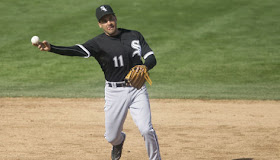With the bases loaded and nobody out in the top of the third inning, Kansas City Royals shortstop Yuniesky Betancourt barely got a piece of a pitch from Mark Buehrle. Off the bat, the ball bounced just a couple feet in front of catcher A.J. Pierzynski, who quickly snatched it up, stepped on home plate for the force out and immediately fired a throw down to third baseman Brent Morel, who snagged the throw ahead of a diving Wilson Betemit.
Morel then made the bold decision to go for the out at second base, a play that would normally be impossible given the sequence of events leading up to it. However, the runner on first, Kila Ka'aihue, had dived back towards the bag upon contact and was nowhere near second. Ka'aihue explained his mistake after the game.
"Buehrle is just so deceptive, man. He's crafty. Wiley, even. You never know what he's gonna do. I saw the pitch going towards the plate and I just got this sense that it was gonna turn around and come straight to first base. I didn't want to be caught leaning." Attempts to dispute this possibility based on basic physics were quickly dismissed. "Nah man, you just don't get how crafty Buehrle is. He's tricky. Cunning. Knavish, if you will."
The upshot was that the Royals' DH was out of position and easily thrown out at second base to complete the triple play. But it didn't end there. Sox second baseman Omar Vizquel made the double (or, in this case, double double) play turn and fired to first baseman Paul Konerko. When asked why, Vizquel claimed innocence in his pleasantly mild Spanish accent.
"It wasn't me. Something took over my body and made that throw for me. It was like some, eh, renegade spirit trespassed into my soul and became my essence, and the only way for it to atone for its sins that was keeping it in this world and ascend to the glorious afterlife and be reunited with its loved ones and avoid an eternity of wandering, floating through this world, utterly alone, in a state of constant torment, always regretting not taking advantage of that one chance it had been given by the ultimate power from on high, way up in that magical place to which we all strive, was to catch that ball, turn around and throw it over to Paulo."
 |
| Omar Vizquel had an out-of-body experience while turning "The Play" |
"It was awesome", said Gzowski. "The most awesome thing I've ever seen. Just so freaking awesome. I had to call him out, because of the awesomeness of it. Man. Awesome."
After a brief conference, the umpires decided that Kansas City would start the fourth with one out. "Initially, I thought that idea was ridiculous", said crew chief Lloyd Robertson, "but Gzowski convinced us. He was right: it was friggin' awesome. I mean, who's ever seen a quadruple play? Awesome. An Awesomely Awesome play of Awesome Awesomeness."
Despite its nonsensicalness, the quadruple play has happened before. On June 8, 1953, with the bases loaded, New York Giants shortstop Alvin Dark hit a ball into the right-center gap that was bobbled by the right fielder upon retrieval. Sensing an inside-the-park home run, Dark sped around the bases following his teammates. Unfortunately, the lead runner, catcher Wes Westrum, suffered an horrific injury on the play. He tore his Anterior Cruciate Ligament (ACL) while running, and careened into foul territory, writhing in pain. Not noticing what had happened, perhaps believing the squirming figure on the ground to be the third base coach for some reason, the three other runners passed him, and were called out for their transgression. Westrum himself was called out for leaving the base-paths. The umpires hadn't noticed that four outs had been called at the time, but after coming to the realization penalized the Giants with an extra out in the next inning.
Rumours of a quintuple play in the Negro Leagues in the 1920s have circulated, but as with many alleged events in baseball's early history, the details are hazy and unconfirmed. Speculation has arisen about how such a play could occur: some have hypothesized that certain runners could have been called out more than once for multiple transgressions, that fielders could have been given "bonus outs" for particularly spectacular plays, or that the umpires were corrupt jerks.
Is there video of this?
ReplyDeleteDidn't happen.
ReplyDeleteBut you did fool at least one person.
ReplyDeletehey this story is great
ReplyDeleteGenius!!
ReplyDelete